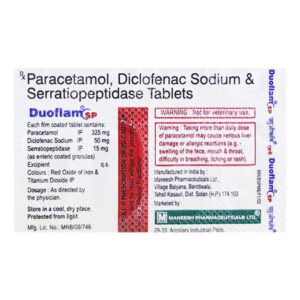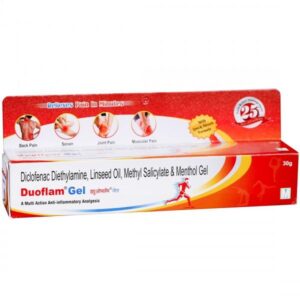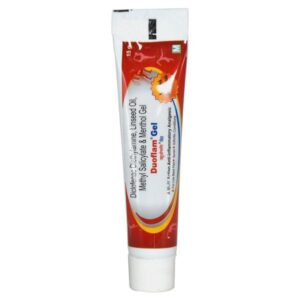LINSEED OIL + MENTHOL + METHYL SALICYLATE + DICLOFENAC DIETHYLAMMON + DICLOFENAC SOD
Linseed Oil: Linseed oil, also known as flaxseed oil, is a natural product derived from the seeds of the flax plant (Linum usitatissimum). It is commonly used as a dietary supplement due to its numerous health benefits.
Linseed oil is rich in alpha-linolenic acid (ALA), an omega-3 fatty acid. The main mechanism of action of linseed oil is through its high content of ALA, which can be converted into eicosapentaenoic acid (EPA) and docosahexaenoic acid (DHA) in the body. These omega-3 fatty acids have anti-inflammatory properties and are important for maintaining healthy cell function.
The main use of linseed oil is to supplement the diet with omega-3 fatty acids, especially for individuals who do not consume enough fatty fish or other sources of omega-3s. It is believed to have various health benefits, including improving heart health by reducing inflammation and lowering blood pressure, supporting brain function and cognitive health, and promoting healthy skin and hair.
The dosages of linseed oil can vary depending on the specific product and individual needs. It is typically available in liquid form or as softgel capsules. The recommended daily dose of linseed oil ranges from 1 to 3 grams, which is equivalent to approximately 1-3 tablespoons of oil or a few softgel capsules. It is important to follow the instructions on the product label or consult a healthcare professional for personalized dosage recommendations.
While linseed oil is generally safe for most people, it can cause some side effects. These may include digestive symptoms such as diarrhea, abdominal discomfort, or gas. Some individuals may also experience allergic reactions, such as skin rashes or difficulty breathing. Due to its blood-thinning effects, linseed oil may increase the risk of bleeding, especially in individuals taking blood-thinning medications. It is advisable to consult a healthcare professional before starting linseed oil supplementation, especially if you have any pre-existing medical conditions or take other medications.
In summary, linseed oil is a dietary supplement derived from flaxseeds that is rich in omega-3 fatty acids. It is commonly used to supplement the diet with these essential fats and may offer various health benefits. However, it is important to use linseed oil as directed and consult a healthcare professional for personalized advice.
Menthol: Menthol is an organic compound that is derived from peppermint or cornmint oil. It is commonly used as a flavoring agent in various food and beverages, as well as in pharmaceutical and personal care products. Menthol is a popular ingredient in topical medications and is known for its cooling and soothing properties.
The primary use of menthol is as a topical analgesic and antipruritic agent. It is commonly found in creams, gels, and ointments used to relieve minor pain and itching associated with conditions like muscle aches, sprains, insect bites, and sunburns. Menthol works by producing a cooling sensation on the skin and altering the perception of pain and itchiness.
The dose of menthol varies depending on the specific product and usage. It is important to follow the instructions provided by the manufacturer or healthcare professional. Menthol products are typically applied to the affected area of the skin and rubbed in gently. It is important to avoid applying menthol products to broken or irritated skin, as it can cause further irritation.
While menthol is generally considered safe when used as directed, it may cause some side effects. Common side effects include mild skin irritation, redness, and a burning or stinging sensation. Some individuals may be allergic to menthol, and in such cases, it can cause more severe skin reactions like itching, hives, or swelling. If any adverse reactions occur, it is recommended to discontinue use and consult a healthcare professional.
In rare cases, excessive use or ingestion of menthol products can lead to systemic effects, such as nausea, vomiting, abdominal pain, dizziness, and even seizures. It is important to adhere to the recommended dosage and avoid using excessive amounts or ingesting menthol-containing products.
Overall, menthol is a versatile compound used for its cooling and soothing properties. When used appropriately, it can provide relief from minor pain and itching. However, it is always advisable to consult a healthcare professional before using any topical medication, especially if you have any pre-existing medical conditions or are taking other medications.
Methyl Salicylate: Methyl Salicylate, also known as wintergreen oil, is a drug that is commonly used as a topical analgesic for pain relief. It is primarily used to relieve muscle aches, joint pain, and minor inflammation associated with conditions like arthritis, backaches, and bruises.
The mechanism of action of Methyl Salicylate involves its ability to provide a counter-irritant effect. When applied topically, it causes a cooling sensation on the skin, followed by a warming sensation. This dual sensation helps to distract the brain from the underlying pain and provides temporary relief. Additionally, Methyl Salicylate has mild analgesic properties that further contribute to its pain-relieving effects.
Methyl Salicylate is available in various forms such as gels, creams, ointments, and liniments. The recommended dose and application frequency may vary depending on the specific product and the severity of the pain. It is typically applied topically to the affected area, and it is important to follow the instructions provided by the manufacturer or as advised by a healthcare professional.
While Methyl Salicylate is generally well-tolerated, it can cause some side effects, especially if used improperly or in excessive amounts. Potential side effects may include skin redness, irritation, rash, or a burning sensation at the site of application. In rare cases, individuals may experience an allergic reaction characterized by hives, itching, or swelling. It is important to discontinue use and seek medical attention if any severe or persistent side effects occur.
It is worth noting that Methyl Salicylate should not be used on broken or damaged skin, as it can be absorbed into the bloodstream and lead to systemic effects such as stomach ulcers or aspirin toxicity in high doses. Moreover, it is contraindicated in children below the age of 12 due to the potential risk of developing Reye’s syndrome, a rare but serious condition affecting the liver and brain.
As a precaution, it is advisable to consult with a healthcare professional before using Methyl Salicylate, especially if you have any pre-existing medical conditions, allergies, or are taking any other medications. They can provide personalized advice on the appropriate use, dose, and potential interactions with other drugs or treatments.
Diclofenac Diethylammon: Diclofenac Diethylammon is a nonsteroidal anti-inflammatory drug (NSAID) that is commonly used to relieve pain and inflammation associated with various conditions, such as arthritis, menstrual cramps, and muscle strains.
The drug works by inhibiting the production of prostaglandins, which are hormone-like substances that contribute to pain and inflammation. By reducing the production of these substances, Diclofenac Diethylammon helps to alleviate pain and reduce swelling.
The usual dose of Diclofenac Diethylammon can vary depending on the individual and the specific condition being treated. Generally, the recommended oral dose is 50 mg to 150 mg per day, divided into multiple doses. However, it is important to follow the instructions provided by a healthcare professional or the medication’s packaging.
Like any medication, Diclofenac Diethylammon can have side effects. Common side effects include stomach upset, heartburn, nausea, and diarrhea. More serious but rare side effects may include gastrointestinal bleeding, liver problems, and allergic reactions. It is important to seek medical attention if any severe or persistent side effects occur.
Diclofenac Diethylammon should not be used by individuals who are allergic to NSAIDs or have a history of allergic reactions to them. It is also not recommended for those who have a history of stomach ulcers, bleeding disorders, or severe kidney problems. Additionally, it is important to inform healthcare professionals about any other medications or supplements being taken, as there is a potential for drug interactions.
Overall, Diclofenac Diethylammon is an effective NSAID commonly used to relieve pain and inflammation. However, it is important to use it under the guidance of a healthcare professional and to be aware of potential side effects.
Diclofenac Sod: Diclofenac Sodium, commonly known by the brand name Voltaren, is a nonsteroidal anti-inflammatory drug (NSAID) that is used to relieve pain, reduce inflammation, and treat various conditions such as arthritis, muscle strains, and menstrual cramps.
The mechanism of action of diclofenac sodium involves inhibiting the production of chemicals in the body called prostaglandins. Prostaglandins are responsible for promoting inflammation, pain, and fever. By inhibiting their production, diclofenac sodium helps to alleviate pain and reduce inflammation.
Diclofenac sodium is available in different forms, including tablets, capsules, gel, and patches. The specific dose and frequency of use depend on the condition being treated, the formulation used, and individual patient factors. It is essential to follow the doctor’s instructions and read the package insert for proper dosing guidelines.
As with any medication, diclofenac sodium can cause side effects. Common side effects may include stomach upset, nausea, vomiting, diarrhea, constipation, drowsiness, dizziness, headache, and skin rashes. In some cases, serious side effects such as gastrointestinal bleeding, kidney problems, liver damage, and heart-related issues may occur. It is crucial to report any persistent or severe side effects to a healthcare professional.
It is important to note that diclofenac sodium may interact with other medications, so it is essential to inform your doctor or pharmacist about all the medications you are taking, including over-the-counter drugs and herbal supplements.
Diclofenac sodium should not be used by individuals with a history of allergic reactions to NSAIDs or aspirin, or those with a history of stomach ulcers or bleeding disorders. It is also not recommended for use during pregnancy, particularly in the third trimester, due to potential harm to the fetus.
In summary, diclofenac sodium is an NSAID used to relieve pain and reduce inflammation. It works by inhibiting the production of prostaglandins. The specific dose and formulation may vary depending on the condition being treated. While generally well-tolerated, diclofenac sodium may cause side effects, and caution should be exercised to prevent potential drug interactions and serious adverse reactions. Patients should always consult with their healthcare provider for personalized dosing instructions and to discuss any concerns or potential risks.



